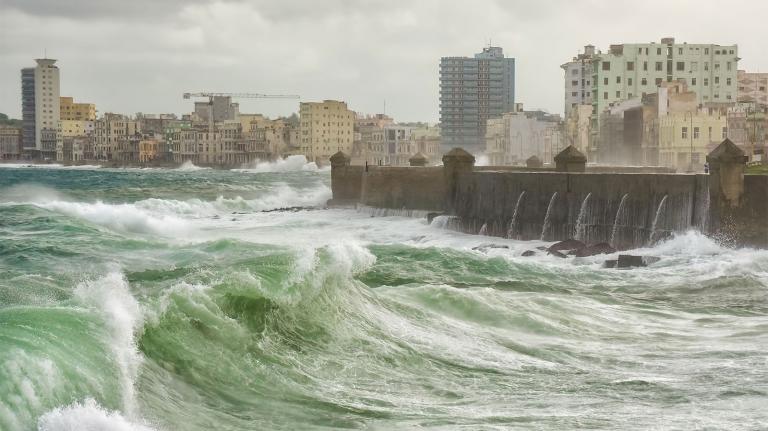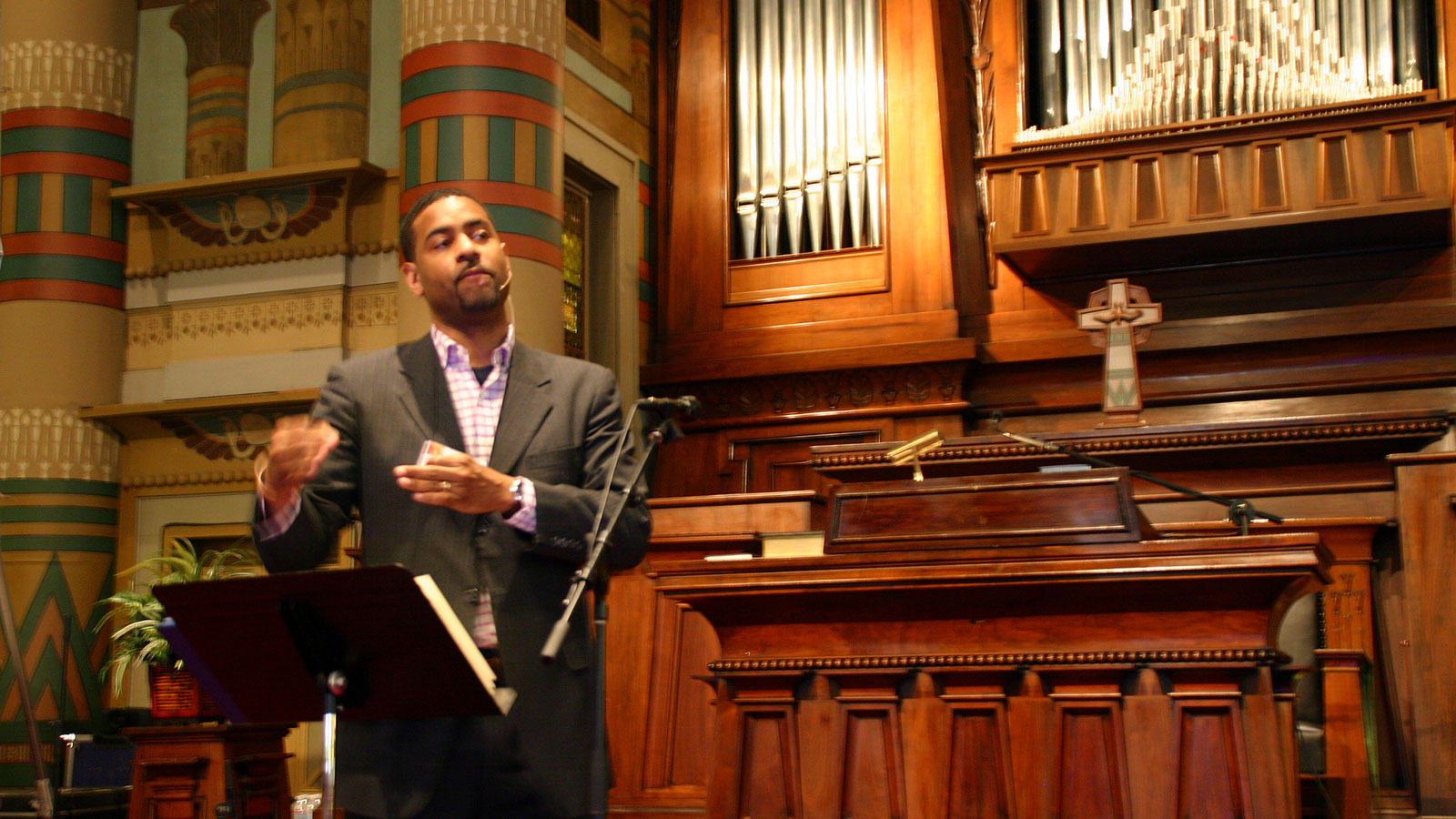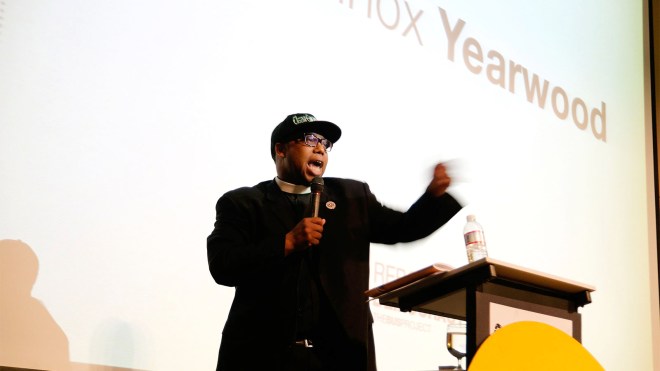It’s a common misconception that churches haven’t been doing their part in the green fight — and black churches in particular. Your John Birch and Alan Keyes Christians notwithstanding, that’s not entirely true.
Katharine Hayhoe, a leading climate scientist, works with evangelical Christians on the issue. Rev. William Barber’s Moral Movement counts promoting environmental justice among its 14-point agenda. Ditto for the Faith Leaders for Environmental Justice in New York, who’ve been working on food, energy, and climate issues for years now. In fact, the environmental justice movement was initiated by a 1987 report commissioned by the United Church of Christ religious denomination.
The tradition continues. In D.C., Rev. Lennox Yearwood has been leading flocks to the climate change struggle through his work not only as a minister, but also as president of the Hip Hop Caucus, which uses the culture to spur youth into political activism. Rolling Stone called him one of the “New Green Heroes” last year. He co-authored a Huffington Post op-ed last with Climate Crisis Solutions President Tom Weis last week calling for a “Zero Emissions Manifesto for the Climate Justice Movement,” challenging world leaders to commit to complete carbon neutrality at the upcoming UN Climate Summit.
Out of Chicago, where city leaders are trying to shake the “Chi-raq” label bestowed upon their city because of all the gun violence, there’s Rev. Otis Moss III, a newcomer to the climate struggles, but fully committed. He heads Trinity United Church of Christ, one of Chicago’s largest churches (and President Obama’s former faith home), which hails from the aforementioned United Church of Christ denomination that helped birth the EJ movement. Over the weekend, Rev. Moss assembled his congregation for the Faith in Place to educate members of the community on local climate change impacts and to whip up support for the EPA’s Clean Power Plan.
I caught up with both last week, to discuss what each is up to in their fights to keep climate change from delivering the Earth to all holy hell. Here’s some of what they told me, in their own words:
Rev. Moss on the role of black churches in the climate fight:
“We believe that this is part and parcel with our relationship and our commitment to Jesus Christ. Our ‘creation care’ ministry says that God has deemed us stewards of the earth — not to have dominion over the earth, but to be stewards. We are leasing space on earth, and God has entrusted us to care for his creation. Issues of climate change and environmental justice directly impact the African-American community. We are adversely affected, with higher rates of asthma, and the dumping of chemical waste in our communities, so developing sustainable communities with low carbon impacts is important to us.”
Rev. Yearwood on how Hip Hop and black churches arrived at the climate conversation:
“We have come into the climate movement not to be the black people’s representation for the climate movement. We are sharing this planet with everybody else. We have a stake to keep this planet running the way it should run for the next generation, and in some respects we have more of a stake, because we’re the worst and first hit when disaster comes through. We appreciate what the people at Sierra Club, NRDC, and 350 do, but if they weren’t having this conversation, we’d still be having this conversation.”
Rev. Moss on renewable energy within the church:
“Here at Trinity, we are integrating solar power into our church so that we can not only be saved by the Son, but also powered by the sun. We are also upgrading our building so that it can capture rainwater, and so we can then use that water for our gardens and appliances. And we will share that power and resources with our surrounding community, by returning to the grid electricity and benefits that can be passed on to our neighbors, whether they attend Trinity or not.”
Rev. Yearwood on powering the climate movement with Hip Hop:
“We decided the movement didn’t have a soundtrack, or a beat. So we began commissioning artists to do an album on climate change. We didn’t just get the progressive artists. We got mainstream artists — like Common, Neo, Raheem Devaughn, Candice Glover, who won American Idol — to record either new music or covers of older songs like Marvin Gaye’s songs, or songs from the 1960s that were environmentally based, but with a new twist to them. We’re going to release this album for free. The artists artists aren’t just singing and rapping, either. You’ll hear them on the album talking about climate change, environmental pollution and their feelings about it. And when you hear them talking about these issues so passionately, you’ll think it’s Bill McKibben or somebody talking in there.”
Rev. Moss on how fighting climate change can also help reduce urban violence:
“One of the hardest areas in Chicago is not to far from our church, Englewood. It has one of the largest numbers of vacant lots in Chicago. And if you live there you are at least 30 minutes away from the closest hospital trauma center. What does this have to do with green? What if we took a percentage of those vacant lots and used them to create urban farms and gardens, and then turned those foods over to schools and programs where the kids can participate in both eating and growing the foods, and then creating an economic engine from that?
“At Trinity, we took our garden and got about 15 kids to work in it this summer and they learned about science and agriculture and they grew incredibly interested in all of this. It shifted their perspective. They’ve gone back to school now, but they thank us and point to that summer program for giving them a different vision of their city and life. It’s not a magic bullet. There’s a tendency when we talk about issues of violence to say want it all over tomorrow. It took us 45-50 years to get here, so we need long-term strategy — not a short-term plan based on punishment, but a long-term plan based on development. And it has to happen by any greens necessary.”
Rev. Yearwood on climate justice and racial equality:
“Once you get how serious [climate justice] is, you know it’s not just about equality but about existence. There are other issues to deal with concerning equality, like how you are treated by the police, racial profiling, and that’s all important, but the deal with climate change is whether we exist or not. This is why the People’s Climate March will be a game changer for the climate movement. It will change how we talk about the issue.
“Like with you, I would read your blogs and think, ‘You know what, the climate movement is not as diverse as we’d like.’ But at the same time, why are we waiting for anybody to invite us to the table? This is our planet, our water, our air, why are we waiting for anybody to say we that we can be a part of this?”
Rev. Moss on why black churches don’t or can’t always make those climate connections:
“I think everyone hasn’t yet connected climate justice to the bread-and-butter issues that affect our communities. What we’re attempting to do here is show how climate change is connected to mass incarceration, food deserts, high asthma rates, hypertension — all of those are deeply connected. It’s also immediacy. If I’m doing a funeral for a young man who was shot dead and someone comes up to me and asks, ‘What about climate change?’ I’ll say I can’t deal with that right now because I’m dealing with this young man who was just killed.
“We’re operating as triage and emergency centers as opposed to preventive care. We don’t all have the bandwidth to deal with all of the issues. We have to learn long-term strategies. We can do triage, but we need the preventive as well. We can talk all day long about bread-and-butter issues, but if we have no polar caps, we’re not gonna be discussing anything.”
Rev. Yearwood on the upcoming People’s Climate March and whether marches matter:
“Marches definitely matter. They’re critical for us to come together for organizing and networking, but the more important part is when people stay in touch after the march. It gets people to continue to push things forward, either through direct action or creating new public policy. They also help people to connect the dots between various issues. We have to use this march strategically, and we’re doing that by shining a spotlight on the UN Climate Summit, to bring awareness to the world about this problem, and I believe that will help the long-term goals. I hope this march will spawn other marches.”
Rev. Moss with the bottom line on climate justice and faith:
“I’ve been reading Walter Brueggemann, the Old Testament scholar, and he talks about what the Bible says will happen to humanity when we disrespect the gift that God has given us. When we operate with injustice against each other, it throws things out of balance. So the floods, the heating of the earth, climate change — this is all happening not because it’s just part of ebb and flow of nature. It is the impact of an arrogant humanity that sees the earth as something that we should dominate and exploit versus a gift that we are here to care for.”





